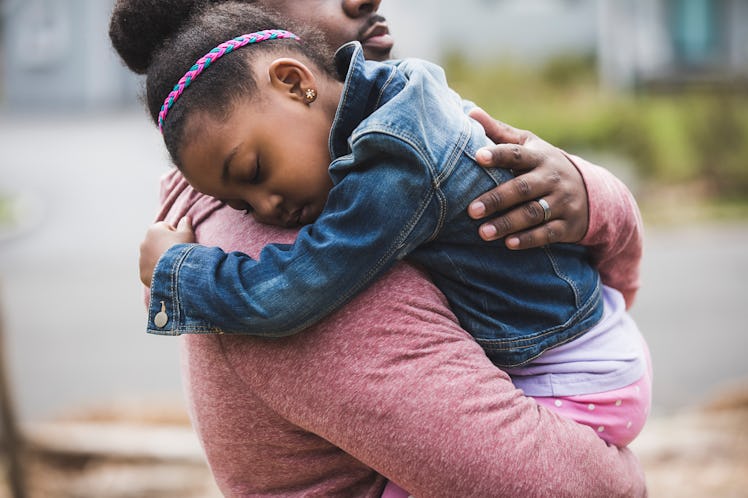How To Help A Kid Scared By School Shootings: Be Honest
How do parents address legitimate fears of gun violence without exacerbating the harm done? Carefully.

In this week’s edition of Fatherly Advice, a dad, unsure of how to talk to his frightened elementary-aged kids about school shootings, seeks advice on how to make them feel safe. Is there a way to be honest about violence? Absolutely. But the devil is in the details.
Fatherly,
I drive my kids to elementary school in the morning. It’s maybe a 20-minute ride and I usually have the radio on listening to the news. It’s never really been a problem until the other day when they reported about a school shooting in Colorado. I tried to turn the radio off real quick, and I didn’t think my kids heard anything. But then the next morning, my 8-year-old was really quiet and he was saying he didn’t want to go to school. When I asked what was going on and if he was sick or anything, he said he was scared because what if bad people came in and started shooting.
At first, I thought he was just making it up, but he did look really scared and he was tearing up and stuff. I honestly did not know what to say, but I told him he was safe and it wasn’t going to happen, and then he asked why they have to practice then, and I really did feel like a liar. He did go to school after some hugging and telling him it would be okay. He was okay later when he came back from school.
My question is: How do I talk to him about this stuff and still be honest? Is there a way I can make him feel better about going to school or talk to him about school shootings so he doesn’t feel scared? How can I make him feel safe?
Chase
*
Chase, the first thing I’m going to recommend is that you turn off the news in the car in the morning. At least until your kids are delivered to school. Maybe opt for some classic rock. Or maybe even a cool kid’s podcast like “Wow in the World” or “Highlights Hangout.” Anything would be better than the doom and gloom of news coverage. They’ll inherit the damaged world we’re leaving them soon enough. We don’t need to have them worrying about it in the meantime.
That said, there is some science about why it’s important to keep your kids away from the news for a while. It turns out that while it appears like elementary school kids are better able to grasp the complexity of new stories, they’re still terrible at understanding what risk those stories might pose to them. A school shooter in Colorado is as real and present as a school shooter in their own backyard. The distance between them and Colorado makes zero difference. To them, the danger is present and real. You can’t contextualize news using numbers until a kid is much older. And without that context, the news can become a series of perceived threats.
That said, it’s likely that your child will find out about recent school shootings via other means. So even if he hasn’t said anything to you about a shooting in the news, you should still take time to have a conversation about it.
As your son so aptly pointed out, the danger of school shooters is further reinforced by active shooter drills in school. And it’s unlikely those drills are going to come to an end anytime soon because we are nowhere near solving the problem of school shootings. That means the likelihood of your kid being frightened again is pretty high. Much higher, in fact, than the chances he’ll ever become a victim of gun violence in his school. And that’s what you are going to have to stress to him.
Your job is to tell him that you and other adults want to keep him safe and will do that to the best of their ability. It’s also to help him understand that there are bad people in the world sometimes, but we are always looking out for them, and they are few and far between.
I recommend asking him about how he’s feeling now, after being afraid to go to school. Ask him if he has any questions. But only ask if you are prepared to listen and answer honestly. And when I say honestly, I do not mean explicitly. You will not, for instance, want to go into the gory details of what it’s like to be shot. Tell the truth, but tell it simply. Try to use non-threatening language: ‘Bad guy’ instead of a ‘shooter,’ or ‘harm’ and ‘hurt,’ instead of ‘kill.’ Remind him that just like fire drills, the lockdown practice in school is meant to help keep him safe. The chances of his school actually catching on fire are about as slim as a bad guy trying to harm him in school. But you practice anyway.
The idea is to be as reassuring as possible. And above all, let him know you and his teachers are looking out for him always. That is not a lie.
Between managing the information he receives about the big bad world and assuring him that he is safe and sound with you and his teachers, he’ll probably start feeling better. In the meantime, hopefully, we adults can start talking about real solutions for school shootings to save future fathers from having these conversations too.
This article was originally published on